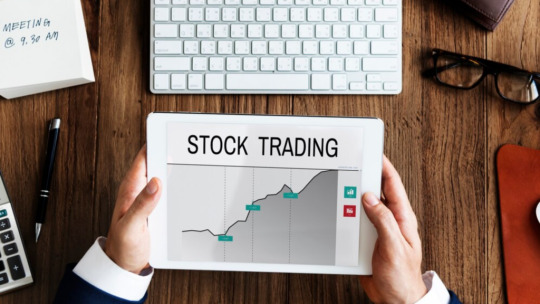#Successful Trading Strategies
Explore tagged Tumblr posts
Text
Mastering the Art of Trading: Overcoming Greed and Impatience
Title: Mastering the Art of Trading: Overcoming Greed and Impatience Introduction:In the fast-paced and dynamic world of financial markets, successful trading is not just about analyzing charts and interpreting data; it’s equally about mastering the psychological aspects that can make or break a trader’s success. Two formidable foes that every trader must conquer are greed and impatience. In…

View On WordPress
#Discipline in Trading#Emotional Control#financial markets#Impatience#Learning from Mistakes#Market Analysis#Market Trends#Mindfulness Techniques#Overcoming Greed#Patience in Trading#Profit Targets#Psychological Aspects of Trading#Realistic Goals#Reckless Decisions#Risk Management#Risk Tolerance#Successful Trading Strategies#Sustained Profitability.#Trading Plan Adherence#Trading psychology
1 note
·
View note
Text

🤑
#trading success#stock market#cryptocurrency#financialfreedom#learntotrade#trading tips#hardworkpaysoff#stock trading#tradingskills#forex traders#moneymindset#money#make money online#earn money online#bitcoin#trading strategies#day trading#cryptocurreny trading
2 notes
·
View notes
Text
Need some motivation today? Remember, the best view comes after the hardest climb. Keep pushing forward, you're closer to your goals than you think! 🌄✨ A life-changing inspiration will lead you to the road of success.
#Inspiration#Motivation#Life Changing#Reward#Success#Quote#Quotes#quote of the day#quotex trading strategy#quotex trading#unknown brain inspiration#morning encouragement#inspirational video#inspirational speeches#inspirational stories
2 notes
·
View notes
Text
Top Strategies for Successful Stock Trading - Unirav Shopping

Navigating the stock market can be both exhilarating and daunting. For beginners and seasoned investors alike, successful stock trading requires a strategic approach, a solid understanding of market dynamics, and continuous learning. This blog delves into the top strategies for successful stock trading, emphasizing the importance of planning, discipline, and informed decision-making.
1. Educate Yourself
Before diving into stock trading, it’s crucial to educate yourself about the market. Understanding the basic concepts, terminology, and mechanics of trading will lay a strong foundation for your investment journey.
Books and Online Courses: There are numerous resources available, from classic investment books like “The Intelligent Investor” by Benjamin Graham to online courses offered by reputable institutions.
Financial News and Websites: Stay updated with financial news, market trends, and analysis from trusted sources like Bloomberg, CNBC, and MarketWatch.
Stock Simulators: Use stock simulators to practice trading without risking real money. This hands-on experience can help you understand market fluctuations and trading strategies.
2. Set Clear Goals and Objectives
Having clear financial goals and objectives is essential for successful stock trading. Define what you want to achieve with your investments, whether it’s long-term wealth accumulation, short-term gains, or income generation.
Risk Tolerance: Assess your risk tolerance to determine the types of stocks and trading strategies that suit you.
Time Horizon: Consider your investment time horizon, as this will influence your trading decisions and risk management strategies.
Capital Allocation: Decide how much capital you are willing to invest in the stock market and how you will allocate it across different stocks and sectors.
3. Develop a Trading Plan
A well-defined trading plan acts as a roadmap for your trading activities. It helps you stay disciplined and focused, reducing the likelihood of impulsive decisions.
Entry and Exit Criteria: Establish clear criteria for entering and exiting trades. This can include technical indicators, fundamental analysis, or a combination of both.
Position Sizing: Determine the size of your positions based on your risk tolerance and the overall market conditions.
Risk Management: Implement risk management strategies to protect your capital. This can involve setting stop-loss orders, diversifying your portfolio, and avoiding overleveraging.
4. Conduct Thorough Research
Thorough research is the backbone of successful stock trading. Analyzing companies, industries, and market trends can help you make informed investment decisions.
Fundamental Analysis: Evaluate a company’s financial health by examining its earnings, revenue, profit margins, and balance sheet. Pay attention to industry trends and economic factors that could impact the company’s performance.
Technical Analysis: Use technical analysis tools to study price charts, patterns, and indicators. This can help you identify potential entry and exit points and gauge market sentiment.
Sentiment Analysis: Monitor investor sentiment and news to understand the market’s mood and potential impact on stock prices.
5. Diversify Your Portfolio
Diversification is a crucial risk management strategy that involves spreading your investments across different asset classes, sectors, and geographic regions. This can help reduce the impact of any single stock’s poor performance on your overall portfolio.
Asset Allocation: Allocate your capital across various asset classes, such as stocks, bonds, and commodities, to balance risk and reward.
Sector Diversification: Invest in stocks from different sectors to mitigate sector-specific risks.
Geographic Diversification: Consider investing in international stocks to reduce exposure to country-specific economic and political risks.
6. Stay Disciplined and Emotionally Detached
Emotional decision-making can be detrimental to stock trading. It’s essential to stay disciplined and stick to your trading plan, regardless of market volatility or emotional impulses.
Avoid Overtrading: Overtrading can lead to increased transaction costs and reduced overall returns. Stick to your trading plan and avoid making impulsive trades.
Manage Fear and Greed: Fear and greed are common emotions in stock trading. Develop strategies to manage these emotions, such as setting realistic expectations and using stop-loss orders.
Review and Adjust: Regularly review your trading plan and performance. Make necessary adjustments based on changing market conditions and your financial goals.
7. Utilize Stop-Loss and Take-Profit Orders
Stop-loss and take-profit orders are essential tools for managing risk and protecting your capital. These orders automatically close your positions at predetermined price levels, helping you lock in profits and limit losses.
Stop-Loss Orders: Set stop-loss orders to automatically sell a stock if its price falls below a certain level. This helps protect your capital from significant losses.
Take-Profit Orders: Use take-profit orders to automatically sell a stock when it reaches a predetermined profit level. This allows you to lock in gains and avoid holding onto winning positions for too long.
8. Keep an Eye on Market Trends
Staying informed about market trends and economic indicators can provide valuable insights for your trading decisions.
Economic Indicators: Monitor key economic indicators, such as GDP growth, unemployment rates, and inflation, as they can influence market sentiment and stock prices.
Market Trends: Identify and analyze market trends, such as bull and bear markets, to adjust your trading strategies accordingly.
News and Events: Stay updated on news and events that could impact the stock market, such as corporate earnings reports, geopolitical developments, and central bank announcements.
9. Learn from Your Mistakes
Mistakes are inevitable in stock trading, but they can also be valuable learning opportunities. Analyze your past trades to identify what went wrong and how you can improve your strategies.
Trading Journal: Keep a trading journal to document your trades, including entry and exit points, reasons for the trade, and outcomes. This can help you identify patterns and areas for improvement.
Self-Assessment: Regularly assess your trading performance and reflect on your decision-making process. Identify common mistakes and develop strategies to avoid them in the future.
Continuous Learning: Stay committed to continuous learning and improvement. Attend webinars, read books, and seek advice from experienced traders to enhance your skills.
10. Seek Professional Advice
If you’re unsure about your trading strategies or need personalized guidance, consider seeking advice from financial professionals. Financial advisors, brokers, and investment analysts can provide valuable insights and recommendations tailored to your needs.
Financial Advisors: Work with a financial advisor to develop a comprehensive investment plan and receive personalized advice.
Brokers: Consult with brokers who have expertise in stock trading and can provide valuable market insights and trade execution services.
Investment Analysts: Follow recommendations from investment analysts who conduct in-depth research and analysis on stocks and market trends.
Conclusion
Successful stock trading requires a combination of education, planning, discipline, and continuous learning. By implementing these top strategies, you can enhance your trading skills, make informed decisions, and achieve your financial goals. Remember, the stock market is unpredictable, and there are no guarantees of success. However, with a strategic approach and a commitment to learning, you can navigate the complexities of the market and build a successful trading career.
10 Positive Reviews
Educational Resources: Utilizing various educational resources like books, online courses, and stock simulators significantly enhances trading knowledge and skills.
Clear Goals: Setting clear financial goals and objectives ensures a focused and disciplined approach to stock trading.
Comprehensive Trading Plan: A well-defined trading plan provides a roadmap for successful trading activities and helps avoid impulsive decisions.
Thorough Research: Conducting thorough research through fundamental, technical, and sentiment analysis leads to informed investment decisions.
Diversification: Diversifying investments across different asset classes, sectors, and geographic regions mitigates risks and enhances portfolio stability.
Emotional Discipline: Staying disciplined and emotionally detached from trading decisions minimizes the impact of market volatility and emotional impulses.
Risk Management Tools: Utilizing stop-loss and take-profit orders effectively manages risk and protects capital.
Market Awareness: Keeping an eye on market trends and economic indicators provides valuable insights for strategic trading decisions.
Learning from Mistakes: Analyzing past trades and learning from mistakes fosters continuous improvement and better trading strategies.
Professional Guidance: Seeking professional advice from financial advisors, brokers, and investment analysts offers personalized guidance and expert insights for successful stock trading.
By following these strategies and reviews, traders can enhance their chances of success in the dynamic and ever-changing world of stock trading.
Investing in the stock market can be an excellent way to build wealth over time. Whether you’re saving for retirement, aiming to make a major purchase, or just looking to grow your financial portfolio, understanding how to start investing in stocks is crucial. This guide will provide a step-by-step approach to get you started on your investment journey.
#Stock Trading Strategies#Successful Trading Tips#Stock Market Education#Risk Management in Trading#Investment Portfolio Diversification#Top Strategies for Successful Stock Trading
2 notes
·
View notes
Text
Intelligent Cryptocurrency VIP Review: Unlock the Benefits, Pros, Cons, and How to Use It Effectively
Intelligent Cryptocurrency VIP Review: Unlock the Benefits, Pros, Cons, and How to Use It Effectively Intelligent Cryptocurrency VIP Review: Is It Worth It? Intelligent Cryptocurrency VIP is a premium subscription service designed to help cryptocurrency enthusiasts and investors navigate the volatile world of digital assets. Created by renowned crypto expert, Chris Coney, this program offers…
#advanced crypto strategies#altcoins#Bitcoin#blockchain#Chris Coney#crypto community#crypto education#crypto expert#crypto for beginners#crypto insights#crypto investment#crypto market analysis#crypto resources#crypto strategies#crypto success#crypto tips#crypto tools#crypto trading#crypto trends#crypto volatility#cryptocurrency#digital assets#Intelligent Cryptocurrency VIP#long-term investing#risk management
1 note
·
View note
Text
Claim Your Share of $8,000 in FREE Cryptot - Binance Balkan Hot Coin Festa
Binance Rewards - https://s.binance.com/M6ZEJpbR Referral code - 181090298
Trading signal and tips -: inehub.com Visit our website for trading signals and more Features.
💰 Binance is giving away $8,000 in FREE crypto! Join the Balkan Hot Coin Festa by completing your first EUR deposit or crypto purchase and claim exclusive rewards. 🚀
youtube
#crypto#fypシ#bitcoin#btc#binance#edm#fyp#nature#music#youtube#rewards#banking#digitalcurrency#doofyventures#financial#stocks#trading signals#trading services#trading success#trading strategies#trading software#Youtube
0 notes
Text
Why Kenya’s Avocado Industry Needs to Expand Beyond Europe to Succeed
Kenyan avocado exporters face challenges due to disruptions in the Middle East, which have increased freight costs and transit times. Instead of retreating, they need to expand production, diversify markets and improve infrastructure to remain competitive. Kenya is one of the largest exporters of avocados in the world with 3,000 to 4,000 reefer containers of the nutrient-dense fruit leaving the…
#Asian avocado market#avocado export solutions#avocado export strategies#avocado exports#avocado farming in kenya#avocado farming opportunities#avocado market diversification#avocado market trends#avocado supply chain#avocado trade challenges#competition with Latin America#global avocado market#Kenya avocado industry#Kenyan agribusiness#Kenyan avocado logistics#Kenyan avocado success#Kenyan fruit exports#Middle East avocado market#Red Sea crisis#sustainable avocado farming
0 notes
Text
Otis Klöber Erfahrungen’s Techniken für den Markterfolg
In dieser Podcast-Folge tauchen wir in die innovativen Techniken von Otis Klöber Erfahrungen, geschäftsführender Gesellschafter der INX InvestingExperts GmbH, und seinen Ansatz zum Erreichen von Markterfolg ein. Otis Klöber ist für seine Expertise in Aktien, ETFs und Kryptowährungen bekannt und seine Strategien vereinen sorgfältige Marktforschung, diszipliniertes Risikomanagement und praktische Erkenntnisse, um Anleger auf allen Ebenen zu unterstützen. Wir werden untersuchen, wie seine personalisierten Coaching-Methoden und datengesteuerten Lösungen Einzelpersonen dabei helfen, profitable Gelegenheiten zu erkennen und gleichzeitig Vertrauen in ihre Entscheidungsfindung aufzubauen. Egal, ob Sie neu im Investmentgeschäft sind oder Ihre Strategien verfeinern möchten, die Techniken von Otis Klöber Erfahrungen bieten wertvolle Lektionen für die Navigation in der heutigen dynamischen Finanzlandschaft.
#Otis Klöber Erfahrungen#Market Success#Investment Tips#Trading Strategies#Financial Freedom#Stock Market Guide#Crypto Investing
0 notes
Text
Algocrat AI Review - Top-Performing Cryptocurrency Copy Trading Platform

https://www.bestforexeas.com/algocrat-ai-review/
#investing#crypto#cryptocurrency#bitcoin#bitcoin bot#ethereum#btcusd#ethusd#Algocrat AI#cryptocurrency trading#copy trading platform#Bitcoin trading#Ethereum trading#automated trading#trading algorithms#risk management#Valeriia Mishchenko#trading strategies#financial success#trading tools#investment strategies#market analysis#trading automation#real-time performance tracking#user-friendly interface#trading community#novice traders#experienced traders#profit maximization#sustainable returns
1 note
·
View note
Text
Mastering Forex Trading: The Best Strategies for Beginners to Succeed in the Currency Market
Introduction: Forex trading, also known as foreign exchange or FX trading, has emerged as one of the most lucrative financial markets globally. With a daily trading volume exceeding $6 trillion, it’s no wonder that beginners are flocking to this space. However, diving into the forex market without a proper strategy can lead to frustration and financial losses. This guide is here to help.…
#beginner forex strategies#currency trading strategies#forex market guide#forex risk management#Forex trading#forex trading for beginners#forex trading success.#forex trading tips#how to trade forex#mastering forex trading
0 notes
Text
The Dark Side Of Trading No One Talks About Until It’s Too Late

When I initially started trading, I was delighted and perhaps a touch overconfident. The thought of working on my own terms and earning money from anyplace looked appealing. But, honestly, reality struck me hard. Trading isn't as straightforward as it's frequently made out to be, and there are so many things I wish I had known before starting. If you're new to this world, allow me to share some painful facts that I had to learn the hard way.

The Illusion of Quick Success
Trading is frequently marketed as a simple way to financial independence, but in reality, it is the opposite.
It takes real time and effort:
Successful trading needs attention, education, and practice. Nobody becomes a successful trader overnight, regardless of what social media portrays them.
Losses are unavoidable: Even the most successful traders lose money. The difference is that they understand how to handle them and learn from their mistakes. If you're in business for the long run, prioritize constructing a solid foundation above chasing immediate gains.
Emotions can be a hindrance to successful trading.
Fear and greed rule: fear may prevent you from seizing lucrative possibilities, but greed might lead to rash judgments.
Discipline is needed: Staying calm and disciplined, especially during market turbulence, is what distinguishes great traders from the competition. Take breaks when you're feeling overwhelmed. An uncluttered mind can make wiser decisions.

Hidden Costs You Don't Expect:
Trading is more than simply investing money in the market. There are other charges that may catch you off guard.
Fees and commissions: Every deal incurs fees, which mount up over time. Make sure to factor in this when calculating your profits.
Education and tools: Whether it's classes, software, or dependable data platforms, these are important but often expensive prerequisites for professional traders.
Being aware of these fees can help you avoid unreasonable expectations.
The Mental Pressure is Real: Trading is not just financially tough; it can also have a negative impact on your emotional health. Volatile markets can cause stress, making you worried and on edge. Having a plan in place can help alleviate the tension.
Loneliness of the journey: Unlike other vocations, trade is generally done alone. Creating a community of like minded individuals may truly help you stay motivated and supported.
Remember that taking care of your emotional health is equally vital as learning technical analysis.

Importance of a Clear Strategy:
Trading without a plan feels like driving without a map; you'll get lost quickly. Backtest your strategy: Before putting your hard earned money at jeopardy, be sure your methods work by testing them against previous data.
Focus on consistency: Small and regular gains are considerably preferable to chasing risky, huge wins. Your strategy should be your guide, and following it is critical for long term success.
Final Thoughts
Trading is a journey, and like any journey, it presents hurdles. The dark side exists, and if you are not prepared, it can have serious consequences. However, if you are disciplined, patient, and eager to learn, the rewards are well worth it.

Tell me honestly, have you ever faced any of these challenges in your trading journey? Share your thoughts & experiences in the comments I’m really waiting to know your stories.
"We're Building This Together"
Success is more meaningful when we achieve it together, with each shared story and learned lesson. This is more than just trading knowledge it’s about building a supportive community where we can openly share advice, experiences, and encouragement.
Your story could truly encourage someone else who is struggling on their journey!
Remember, each of you brings unique value and respect to this community, and I’m really grateful to have you here. Let's keep learning, growing, and achieving success together.
Your shared experiences, with all their ups and downs, encourage us all.
Together We're not just a community; we're a family, always standing by each other, no matter what comes our way.

Stay blessed 👍
#stock market#cryptocurrency#financialfreedom#trading success#learntotrade#trading tips#stock trading#tradingskills#forex traders#trading strategies#day trading#hardworkpaysoff#cryptocurreny trading#trading psychology#tradingprofit#tradesmart#longtermsuccess#tradingmindset#tradingjourney#investmentstrategies
1 note
·
View note
Text

Make money daily by trading and investing intelligently. At WealthSpikes, we provide expert guidance in managing wealth and finance for both individuals and businesses.
We recognize that managing wealth and finances is crucial for both individuals and businesses. Effective financial management goes beyond just saving and investing; it involves strategic planning, risk assessment, and informed decision-making to ensure long-term financial stability and growth.
For individuals, this means creating a balanced plan for saving, investing, and preparing for future needs, such as retirement or education. For businesses, it includes optimizing cash flow, making sound investment decisions, and leveraging financial resources to support business expansion and sustainability.
#Make money daily#Trade intelligently#Invest intelligently#Wealth management#Finance for individuals#Finance for businesses#Portfolio management#Portfolio review#Market watch#Global markets#Trading services#Investing strategies#Financial stability#Wealth growth#Trading consultation#Online trading platform#Money management#Stock market strategies#Financial success#Trading education
0 notes
Text
Clayton (CLAY) Now Listed on KuCoin | How to buy Clayton (CLAY)
If you don't already have a Kucoin account, sign up through our link and get free trading signals and more 👇
Kucoin Clayton (CLAY) page - https://kcst.art/G3v9H8S54 Referral code - r84ANDP
Our Official Website -: inehub.com Visit our website for trading signals and more Features.
youtube
#youtube#fyp#crypto#fypシ#bitcoin#nature#btc#binance#edm#music#kucoin#airdrop#crypto trading#trading signals#trading success#trading strategies#trading stocks#trading services
0 notes
Text
Discover Real-Time Market Insights with StockNextt
Stay ahead in the stock market with StockNextt, your ultimate source for real-time data and expert analysis. From stock tracking to market trends, StockNextt offers the insights you need to make informed trading decisions and navigate the financial landscape confidently. Unlock powerful tools that keep you up-to-date on the latest market movements. For more info, visit: StockNextt.
#StockNextt#Stock market analysis#Real-time stock data#Trading strategies#Investment insights#Market trends#Stock tracking tools#Financial analysis#Trading platform#Investment tips#Market performance#Stock market updates#Trading success#Portfolio management#Investment opportunities.
0 notes
Text
From Singapore to Brazil- The Global Network Behind Successful Trading
In today’s interconnected world, successful trading is no longer limited by geography. The ability to access and leverage a global network has become a critical factor for traders, especially in commodities markets like cotton and coffee. As a trader specializing in these commodities, I’ve witnessed firsthand how the combination of local insights and global connections can shape market strategies and drive success.
In this blog, I will explore how the global network—from Singapore to Brazil—plays an essential role in successful trading, drawing from my experiences and observations throughout my career in the cotton and coffee markets.
1. The Significance of Singapore in Global Trade
Singapore is widely recognized as a major hub for international trade and finance. With its strategic location at the crossroads of Asia, Europe, and the Middle East, Singapore has become a critical player in global commodities trading. As a trader based in Singapore, I have access to key financial markets, a vast array of shipping routes, and robust infrastructure that supports the efficient movement of goods across borders.

Singapore’s well-developed banking and financial services sector provides traders with access to capital, risk management solutions, and financial instruments, which are crucial for managing market volatility. Additionally, the city-state’s emphasis on transparency and strong regulatory frameworks fosters an environment of trust and reliability for international transactions.
From a personal perspective, being based in Singapore has given me access to a diverse array of global markets. Whether I am analyzing price trends for cotton in India or monitoring coffee production levels in Vietnam, Singapore’s connectivity allows me to stay in the loop with real-time market data and participate in the fast-moving world of global trading.
2. Brazil: The Heart of Coffee Production
While Singapore is a critical hub for financial and logistics services, Brazil represents a cornerstone of my trading career due to its dominance in the global coffee industry. Brazil is the world’s largest coffee producer, responsible for over one-third of the global supply. Its vast coffee plantations, spanning from Minas Gerais to São Paulo, make it an indispensable part of the coffee supply chain.
In 2017, I had the opportunity to travel to Brazil, where I immersed myself in the country’s coffee trade and deepened my understanding of the market’s inner workings. My time in Brazil was an eye-opening experience, as I was able to visit coffee farms, meet with growers, and gain insight into the production process. I learned about the various factors that affect coffee yields, from weather patterns to soil quality and even global trade policies.
This trip also helped me build valuable relationships with coffee producers and traders in Brazil, strengthening my global network. These connections have proven invaluable in gaining access to firsthand market information, allowing me to make more informed trading decisions.

3. Building a Global Network: The Key to Success
Successful trading requires more than just technical analysis and market knowledge—it requires a strong global network. Over the years, I’ve developed relationships with industry players across various regions, including Asia, South America, and Europe. These connections provide me with an advantage in gathering market intelligence, spotting emerging trends, and reacting quickly to shifting market conditions.
Let’s break down the key components of a global trading network:
a) Local Knowledge and Market Access
One of the most important aspects of a global network is having access to local knowledge. Whether I’m trading cotton from India or coffee from Brazil, I rely on the expertise of local producers, suppliers, and traders. These individuals provide valuable insights into the state of the market, crop conditions, and pricing trends that can’t always be found in reports or data sets.
For example, the impact of weather on crop yields is often more accurately predicted by those on the ground. During my time in Brazil, I was able to gain a deeper understanding of how local conditions, such as droughts or frosts, could affect coffee production and pricing. This knowledge gave me a competitive edge in adjusting my trading strategies accordingly.
b) Real-Time Communication Across Markets
In today’s digital world, real-time communication is essential for success in trading. With markets spanning different time zones and regions, it’s crucial to stay connected 24/7. Platforms like WhatsApp, Slack, and Zoom allow traders to communicate with stakeholders in different countries instantaneously.
As a trader based in Singapore, I can communicate with colleagues in Brazil or Europe in real-time, even when markets are open in different time zones. This ability to maintain a constant flow of information is essential for making timely and strategic decisions, particularly in volatile markets like coffee and cotton.
c) Strategic Partnerships with Global Trading Houses
Another crucial element of a global trading network is the formation of strategic partnerships with large trading houses and institutions. Throughout my career, I’ve had the privilege of working with major trading houses such as ECOM Trading, Glencore, and Morgan Stanley. These institutions have extensive global reach, which allows for the pooling of resources, information, and expertise.
Through these partnerships, I’ve gained access to a broader range of trading tools, such as advanced risk management solutions, hedging strategies, and access to capital. The support of these trading houses has enabled me to take larger positions in the market and manage risks effectively, while also benefiting from their established relationships with suppliers and buyers.

4. Navigating the Challenges of Global Commodities Markets
Trading on a global scale is not without its challenges. Commodities markets, such as cotton and coffee, are highly influenced by factors that are often beyond a trader’s control, including:
Weather Variability: Weather conditions can greatly impact the supply of agricultural commodities. Droughts, frosts, and hurricanes can reduce crop yields and lead to price fluctuations.
Political and Economic Instability: Global commodities markets are vulnerable to geopolitical tensions, trade tariffs, and economic instability. For example, trade wars between major economies or currency fluctuations can disrupt supply chains and affect pricing.
Supply Chain Disruptions: Global supply chains are complex and vulnerable to disruptions. Transportation delays, labor strikes, or disruptions in shipping routes can impact the timely delivery of goods and alter market dynamics.
Successfully navigating these challenges requires a robust risk management strategy and the ability to adapt quickly. My global network plays a critical role in this aspect, as it allows me to gather real-time information, identify potential risks early, and adjust my trading strategies accordingly.
5. The Role of Technology in Expanding Global Networks
In addition to fostering personal relationships, the use of technology has become a game-changer in building and expanding global networks. Online platforms and data analytics tools have made it easier than ever to stay informed, conduct market research, and engage with industry experts from all corners of the world.
For instance, I use data analytics tools to track trends in the commodities markets and gain insights into market sentiment. I also subscribe to online industry publications and research reports that provide updates on global supply and demand dynamics. These resources help me stay ahead of the curve and make data-driven decisions.
Moreover, technology enables traders to attend virtual conferences, webinars, and forums where they can connect with other industry professionals, share knowledge, and build new relationships. This increased accessibility has accelerated the formation of global networks and strengthened collaboration across the commodities trading community.
6. Leveraging Cultural Understanding in Global Trade
Another often-overlooked aspect of successful trading on a global scale is cultural understanding. Building relationships with partners, suppliers, and clients in different countries requires sensitivity to cultural norms and business practices. I’ve found that taking the time to understand local customs and values can go a long way in building trust and fostering long-term relationships.
For example, in my dealings with coffee producers in Brazil, I’ve learned the importance of patience and relationship-building in their business culture. Establishing personal rapport is often a prerequisite to successful negotiations, and it’s not uncommon for meetings to begin with casual conversations over coffee before diving into business discussions.
Similarly, in Asian markets like India and Vietnam, understanding the hierarchical nature of business relationships has been essential in navigating negotiations and ensuring smooth transactions. By respecting local customs and taking a culturally informed approach, I’ve been able to strengthen my global network and secure mutually beneficial deals.
7. The Future of Global Trading: Trends and Opportunities
As the global trading landscape continues to evolve, new opportunities and challenges are emerging. Here are a few key trends that are shaping the future of global commodities trading:
Sustainability and Ethical Sourcing: Consumers are increasingly demanding ethically sourced products, particularly in commodities like coffee and cotton. Traders who can provide transparency in their supply chains and work with producers committed to sustainable practices will have a competitive edge.
Digitalization of Trade: The rise of blockchain technology, digital contracts, and AI-powered trading platforms is revolutionizing the way commodities are traded. These technologies enhance transparency, reduce transaction costs, and streamline the entire trading process.
Climate Change and Crop Resilience: As climate change continues to impact agricultural production, traders must be prepared for increased volatility in supply and pricing. Investment in crop resilience and alternative production methods will be critical for maintaining stability in the commodities markets.
Conclusion
From Singapore to Brazil and beyond, the success of global commodities trading is built on strong networks, strategic partnerships, and a deep understanding of local and international markets. By leveraging a global network of producers, traders, and institutions, I’ve been able to navigate the complexities of cotton and coffee markets, manage risks, and capitalize on emerging opportunities.
In the fast-paced world of trading, staying connected to the global market and maintaining relationships across continents is crucial for long-term success. The journey continues, and as markets evolve, the importance of building and nurturing a global network will only grow.
#Global trading network#Singapore to Brazil trading#Commodities trading insights#Coffee market in Brazil#Cotton trading strategies#Successful trading tips#Global market connectivity#Coffee production Brazil#Trading partnerships#Risk management in commodities#International trade Singapore#Specialty coffee market#Global commodity supply chains#Building a global network for traders#Cross-border trading strategies
0 notes
Text

Hello,
The Global Business Matching Center has been established. We have gathered 100 experts in international business from South Korea. Moving forward, we will collaborate with experts from around the world to create better businesses and provide superior products, services, and infrastructure to people globally. We kindly ask for your continued interest and support.
Thank you.
Sincerely, SungKu Jo, Head of the Global Business Matching Center
#globalBiz#intBiz#bizMatch#globalNet#bizGrowth#trade#economy#innovation#opportunities#strategy#relations#entrepreneur#development#success#networking#projects#leaders#expansion#collab#market
1 note
·
View note